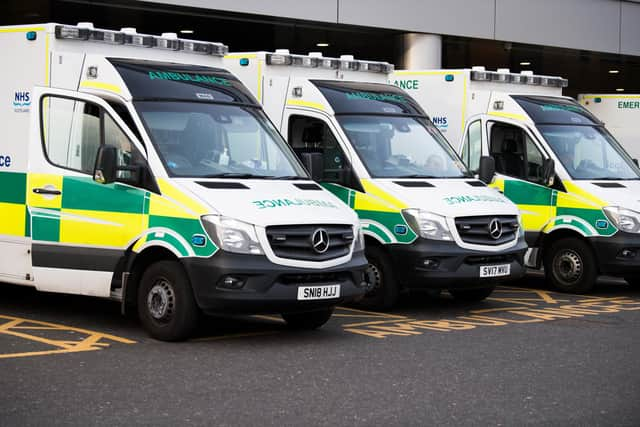Covid Scotland: NHS 'on the brink' as A&E waiting times worst since records began
Just 76.5 per cent of people were seen within four hours in the first week of this month. The Scottish Government target is 95 per cent.
At the same time, the number of visits in this week dropped by almost 3,000 to 25,582.
Advertisement
Hide AdAdvertisement
Hide AdDr John-Paul Loughrey, vice-chair of the Royal College of Emergency Medicine Scotland, said the situation was becoming “increasingly challenging” as departments manage high demand with fewer beds and fewer staff.


“The workforce is facing this ongoing reality every day, ensuring they deliver high-quality effective care and that all patients are safe,” he said.
"These pressures are unsustainable and cannot continue. There is a misconception that as life has returned to normal, so too have hospital services, but the health service has been continually on the brink for some time.
"It is the hard work and dedication of staff that keep it from going over despite many facing burnout, exhaustion, stress and moral injury.”
Dr Loughrey called on the Scottish Government to “recognise what is really going on, on the ground, the challenges staff face day to day”, and to support the health service and its workers.
He warned the NHS could slip “over the brink” if ongoing pressures were not tackled, at a cost to patient health and safety.
It comes amid reports from health boards across Scotland that hospitals are struggling to cope with high demand and high levels of staff absence.
Judith Park, director of acute services in NHS Lanarkshire, where waiting times are the worst, said pressure on hospitals was “showing no signs of easing”.
Advertisement
Hide AdAdvertisement
Hide Ad"We continue to see exceptionally high numbers of people attend A&E, including many who attend for conditions that would be best treated elsewhere,” she said.
Scottish Conservative shadow public health minister Dr Sandesh Gulhane labelled the situation a “fully-fledged crisis”.
"A summer of inaction and delay is harming frontline services,” he said.
Health secretary Humza Yousaf said people visiting A&E are “much sicker and require higher levels of care” than before.
“Our NHS staff have faced unprecedented pressures over recent weeks,” he said.
"They work tirelessly and consistently to respond to the pandemic whilst continuing to provide vital treatment and optimal patient care.
“We are in daily contact with every board and are monitoring the situation closely.
“Hospitals are reporting increased levels of people attending A&E who are much sicker and require higher levels of care.
Advertisement
Hide AdAdvertisement
Hide Ad“Weekly performance is impacted due to a range of challenges, including high attendances, staffing pressures due to isolation and annual leave, and the continued requirement for infection control precautions that is affecting the time people need to spend in A&E.”
He added: “The boards are in the process of recruiting additional staff with this funding and we expect to see an impact of our rapid action in the coming weeks.”
A message from the Editor:
Thank you for reading this article. We're more reliant on your support than ever as the shift in consumer habits brought about by coronavirus impacts our advertisers.
If you haven't already, please consider supporting our trusted, fact-checked journalism by taking out a digital subscription.
Comments
Want to join the conversation? Please or to comment on this article.
